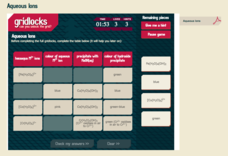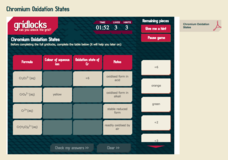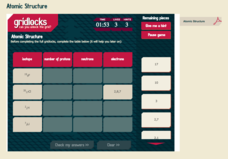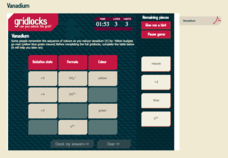Royal Society of Chemistry
Complex Ion Shapes
Things are really shaping up! Provide young chemists with polyatomic ion practice using an interesting interactive. Individuals complete puzzles focused on molecular geometry and complex ions.
Royal Society of Chemistry
Aqueous Ions
Lose an electron? You should keep an ion it! Scholars test their knowledge of aqueous ions while completing four puzzles. Each puzzle requires knowledge of the ion, the color of the ion, the precipitate, and the color of the precipitate.
Royal Society of Chemistry
Naming Complexes—Ligands
Naming complexes can be, well, pretty complex! Simplify a study of ligands using interactive puzzles. Junior chemists match up the name, formula, and complex name, then solve a series of logic games with the information.
Royal Society of Chemistry
Born-Haber Cycle: NaCl
Max Born and Fritz Haber developed the Born-Haber cycle in 1916, which is used for measuring enthalpy that otherwise couldn't be measured. Young scientists solve four matching puzzles using their knowledge of the stages, standard...
Royal Society of Chemistry
Chromium Oxidation States
Colorful chromium is captivating! Science sleuths solve a series of puzzles using an interactive resource. Individuals relate the oxidation states of chromium to the colors produced when the compound is placed in acidic or basic solutions.
Royal Society of Chemistry
Atomic Structure
Changing the number of neutrons in an atom makes it an isotope, but it does not change the element. Pupils complete logic puzzles, matching isotopes with their unique number of protons, neutrons, and electrons. Either on paper or timed...
Royal Society of Chemistry
Vanadium
Introduce your chemistry scholars to the periodic table's Goddess of Beauty! Through an interactive that highlights the transition metal vanadium, learners discover the colors produced in solution as vanadium changes oxidation state....
Royal Society of Chemistry
Shapes of Molecules—Distortion from the Pure Geometry
Ready to introduce the realities of molecular geometry to chemistry pupils? Use a logic-based interactive! Perfect as individual practice, the puzzles explore the bond angles and repulsions present in three common molecular shapes.
Royal Society of Chemistry
Shapes of Molecules—Geometry of Central Atom
How is a molecule's shape determined? Explore bond angles, lone pairs, and VSEPR theory through a logic-based activity. Chemists pull together information about the major molecular shapes, then use it to solve puzzles.
Royal Society of Chemistry
Flame Test Colours
Scientists identify elements by the color of flame they produce because each element is defined by exactly one line on the emission spectrum. By completing a series of puzzles, scholars reinforce their knowledge of the results of flame...
Chemistry Collective
Chem Collective: Metal Ligand Binding
Use silver chloride to determine the binding constant for a metal ligand complex.












